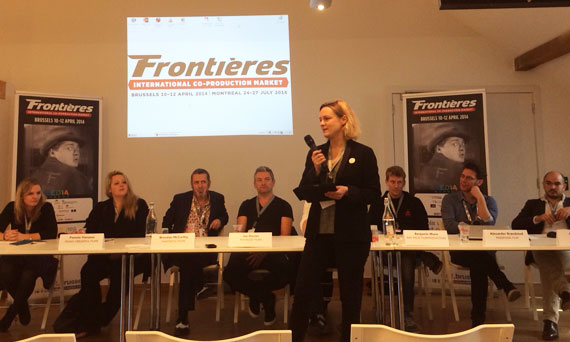La financiación del cine de género en Europa
- In English: EAVE se asocia con el Frontières Market para organizar una conferencia sobre la actitud de los entes de financiación hacia la producción de cine de género en Europa

Este artículo está disponible en inglés.
Following a brief introduction by EAVE’s chief executive, Kristina Trapp, the floor was left to be moderated by two EAVE producers who are working with genre films and who both have their companies based in Ireland and in the UK: Ruth Treacy (Tailored Films) and Pamela Hansson (Penny Dreadful Films). The main topic for the panel was to understand how much soft money is available in the countries represented and how to obtain it; this basically reduced the session down to the simple question of knowing whether or not European funding bodies are interested in financing genre cinema. They are certainly doing so more and more, but without ever quite recognising their support for genre film as a motivation.
French producer Jean Des Forêts (Petit Film) talked about his experience on the development of Freaking, his first attempt at producing a genre film in France with a budget above the average level set for French genre productions (€3.5 million versus the average €2-3 million). For that movie in development – which he brought to the market as an Off-Frontières project – the producer stressed the importance of development money (€250,000 being obtained from MEDIA, Arte, CNC, the regions and some equity in Luxemburg). And the fact that Canal Plus, according to him, is the only and mandatory partner for the production of a genre film in France (despite Arte supporting some unique auteur projects, such as Quentin Dupieux’s movies). Like other speakers in the panel from Denmark, Germany and Scotland, he insisted that the way to approach the funds should never be to highlight the genre aspect, but rather something like: “It’s an auteur-driven film with genre elements,” or: “It’s a character-driven film with drama that also happens to be a unique take on a specific genre.” There is certainly a fear of seeing a wave of slashers and other Zombie flicks cascading onto their desks, and they are being careful to prevent this.
Against the backdrop of international market trends for genre cinema, France still considers the language of the film to be the main criterion for the financial structure of the project. Advance on receipts or TV pre-sales depend on the film being entirely shot in French. That tendency also exists in countries like Sweden or Denmark, where moviegoers don’t appreciate watching their national actors speaking in English. Nevertheless, international markets are more open to English-language movies, despite those national film institutes and broadcasters putting the priority on the domestic box office and therefore prioritising the national language. That’s certainly a bad omen for the future of genre-film production when it comes to public financing.
This is also the case for a country like Denmark, which is half the size of Sweden and yet has the same number of cinemagoers as its neighbour. Around half of the budget of a Danish production can be expected to come from the Danish Film Institute. Co-productions receive less than that, but you still cannot rush into the production of a Danish film without such an important partner, and genre-movie production is not a priority in its editorial line (only three successful genre movies were supported last year in Denmark).
All that, of course, applies to everyone apart from Lars Von Trier…
Quotes from the panel:
Benjamin Munz (Rat Pack Filmproduktion, Germany) – German funds are definitely not supporting genre cinema as a rule. They can, however, be potentially interested in VFX-driven movies for structural spending purposes. Every fund in Germany has its own specificity and should be addressed if the project matches up with that aspect, but we had to teach decision makers from major funding bodies about the existence of the most famous cinema news platforms, such as Aintitcool.com or Twitchfilm.com. They took note and simply had no clue. That’s where Germany is standing right now.
Brendan McCarthy (Fantastic Films, Ireland) – We deliver pitches; no fake promises. A clear proposition from the get-go is the key for what to expect for every one of our partners and our audience alike.
Ian Davies (Initialize Films, UK) – We are a small equity fund. We are hired by national film funds like Creative Scotland to scout for funding for specific small projects. We haven’t worked with genre movies so far, but it could happen if genre is not the only specificity of the film.
Sébastien Beffa (Films Distribution, Sales Agent, France) – We are open to genre in general, but what we are mostly seeking are movies that are launched in big niche festivals that we consider great launching platforms for such movies. Genre films are hard to pre-sell everywhere, except in Germany.
Alexander Bronsted (PingPong Film, Denmark) – We make films, not genre films. We make films that we like, and we happen to like genre films, among others.
(Traducción del inglés)
¿Te ha gustado este artículo? Suscríbete a nuestra newsletter y recibe más artículos como este directamente en tu email.















